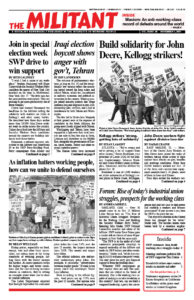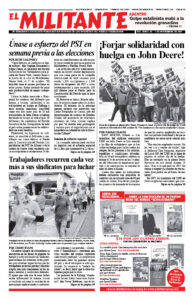The military trial that began Oct. 11 of Blaise Compaore and 13 others for the Oct. 15, 1987, assassination of Thomas Sankara, then president of Burkina Faso, and the overthrow of the popular revolution he led, is increasing interest in Sankara’s ideas and example.
Sankara took power through a mass uprising in 1983 and led working people in that West African country in the face of opposition from U.S. imperialism as well as the country’s former colonial master in Paris. Compaore, a member of the National Council of the Revolution who staged the bloody 1987 counterrevolution and lives in self-imposed exile in Ivory Coast, is being tried in absentia.
Sankara led millions of working people in Burkina Faso to confront the consequences of decades of imperialist exploitation, and to fight to change their conditions.
With broad popular support, the government nationalized the land to guarantee rural toilers the right to use it. It mobilized peasants, workers, craftsmen, women and youth to carry out literacy and immunization drives; build roads, schools and housing; plant trees to hold back the advancing desert; and to irrigate the land. From the start the revolutionary government fought the subjugation of women.
“I come here from a country whose 7 million children, women and men refuse to die from ignorance, hunger, and thirst any longer,” Sankara told the U.N. General Assembly in 1984. “My aspiration is to speak on behalf of my people, on behalf of the disinherited of the world. And to state the reasons for our revolt.”
Sankara’s government was a threat to the imperialist powers’ exploitation of the African peoples and to those like Compaore who viewed him as an obstacle to their own advancement, power and enrichment.
The opponents of the revolution, including local Stalinist forces, believed that by murdering Sankara they could stamp out his ideas and revolutionary example. In that, they have failed. During mass demonstrations that led to the overthrow of Compaore in 2014 many protesters carried photos of Sankara.
To take advantage of renewed interest sparked by the trial, Pathfinder Press is prominently featuring on its website books it publishes of Sankara’s speeches. These include Thomas Sankara Speaks, speeches and interviews with the revolutionary leader, in English and French. Women’s Liberation and the African Freedom Struggle is available in English, French, Spanish, and Farsi, as is We Are Heirs of the World’s Revolutions.
Working people will find that Sankara’s words point the road forward in the fight against exploitation and oppression in Africa and worldwide today. To order, visit www.pathfinderpress.com or contact the nearest distributor.

